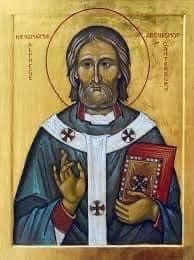
Today the church remembers the embattled Bishop: St. Anselm, Scholar, Erstwhile Bishop of Canterbury, and Preeminent Theologian.
Born in northwestern Italy, Anselm’s childhood was privileged in many ways. His parents were wealthy nobles and, after the death of his mother and an argument with his father, St. Anselm left home at the age of twenty-three to explore the world and further his education.
He found the Benedictine monastery of Bec in Normandy and, though he had been left all the family land by his father (who died while Anselm was abroad), he entered the brotherhood as a novice in 1060. Bec was the intellectual seat of the church at the time, and under St. Anselm’s influence grew ever more so. St. Anselm soon became the prior of Bec and then abbot of the monastery. He encouraged the church to move beyond the recitation of the faith and into an exploration of it. He prized Mary as the mother of God, but argued against her immaculate conception (he didn’t think it was a necessary doctrine). He formalized a process of theology known as “substitutionary atonement,” though it would be his students who would turn it into the (largely heretical) doctrine most know today.
He prized the life of the mind.
Soon he was summoned to be the Archbishop of Canterbury, replacing one of his teachers in the seat. There he entered into a power struggle with the King of England (Rufus…that name didn’t stick) over ultimate authority in the land. Rufus refused to recognize the Pope and, smelling an intense struggle, St. Anselm went to Rome and made his home there for a bit…just until things quieted down in England.
In Rome he worked hard on the Council of Bari (Pope Urban I had appointed him to it) that sought to reunify the Eastern and Western church. It didn’t happen, but St. Anselm’s contributions to the council remain distinguished.
Ultimately King Rufus died and King Henry I (that name did stick!) summoned St. Anselm back to Canterbury. Unfortunately the power struggle continued for the little island to the north, catching St. Anselm in the hot seat there. Now at the end of his days and in poor health, St. Anselm died on Wednesday in Holy Week on this day in 1109.
One of my favorite quotes of St. Anselm is this little ditty about the Christ, a totally feminist viewpoint:
“Are you (Jesus) not a mother too? Indeed you are, and the mother of all mothers, who tasted death in your longing to bring forth children to life.”
St. Anselm is a reminder for me, and should be for the whole church, that the life of the mind is far superior to the recitation of stale doctrine.
-historical bits from Pfatteicher’s New Book of Festivals & Commemorations

Actually, William II (Rufus) was succeeded by Henry I, not Charles, who came somewhat later.
Good call, Gordon. Amended.